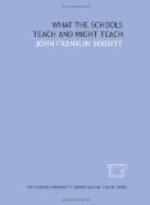Weeks to read First Year Ashmun’s Prose Selections 9 Cricket on the Hearth 5 Sohrab and Rustum 3 Midsummer Night’s Dream 6 Ivanhoe 11
Second Year Autobiography of Franklin 7 Idylls of the King 10 Treasure Island 7 Sketch Book 7 Vision of Sir Launfal 3
Third Year Silas Marner 7 Iliad (Bryant’s—4 books) 5 Washington’s Farewell Address 5 First Bunker Hill Oration 6 Emerson’s Compensation 5 Roosevelt Book 6
Fourth Year Markham’s The Man with the Hoe 2 Tale of Two Cities 10 Public Duty of the Educated Man 4 Macbeth 11 Self-Reliance 6
When a short play of a hundred pages like Macbeth requires nearly three months for reading, when almost two months are given to Treasure Island and nearly three months to Ivanhoe, clearly it is something other than reading that is being attempted. It is perfectly obvious that the high schools are attending principally to the mechanics of expression and not to the content of the expression. The relative emphasis should be reversed.
The amount of reading in the high schools should be greatly increased. Those who object that rapid work is superficial believe that work must be slow to be thorough. It should be remembered, however, that slow work is often superficial and that rapid work is often excellent. In fact the world’s best workers are generally rapid, accurate, and thorough. Ask any business man of wide experience. Now leaving aside pupils who are slow by nature, it can be affirmed that pupils will acquire slow, thorough habits or rapid, thorough habits according to the way they are taught. If they are brought up by the slow plan, naturally when speeded up suddenly, the quality of their work declines. They can be rapid, accurate, and thorough only if such strenuous work begins early and is continued consistently. Slow habits are undesirable if better ones can just as well be implanted.
To avoid possible misunderstanding, it ought to be stated that the plan recommended does not mean less drill upon the mechanical side of reading. We are recommending a somewhat more modernized kind of mechanics, and a much more strenuous kind of drill. The plan looks both toward more reading and improved habits of reading.
One final suggestion finds here its logical place. Before the reading work of elementary or high schools can be modernized, the city must purchase the books used in the work. Leaving the supplying of books to private purchase is the largest single obstacle in the way of progress. Men in the business world will have no difficulty in seeing the logic of this. When shoes, for example, were made by hand, each workman could easily supply his own tools; but now that elaborate




